Tips And Tricks For Safe Pool Chemical Storage
Owning a pool is a luxury that comes with its own set of responsibilities. One of the most crucial tasks for any pool owner is ensuring that pool chemicals are stored safely. Proper storage not only ensures the longevity of your pool equipment but also protects your family from potential hazards. In this comprehensive guide, we will explore the importance of proper pool chemical storage, provide an overview of commonly used chemicals, and offer practical tips for keeping your pool area safe and secure.
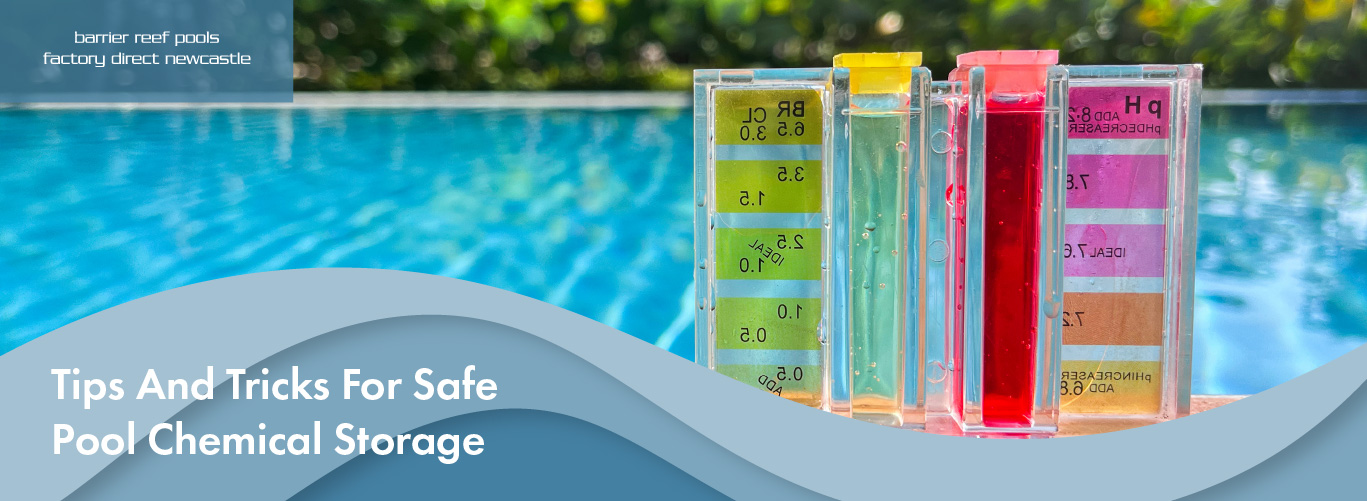
Introduction to Pool Chemical Storage
Swimming pools are a haven of relaxation and fun, especially during the hot summer months. However, maintaining a pool involves more than just skimming the surface and adjusting the pH levels. Responsible pool ownership includes the proper storage and handling of pool chemicals. Improper storage can lead to dangerous accidents, damage to your pool equipment, and even health risks for you and your family.
By following best practices for pool chemical storage, you can ensure that your pool remains a safe and enjoyable place for everyone. In this blog post, we will cover everything you need to know about storing pool chemicals safely, from understanding the different types of chemicals to creating a secure storage area.
Understanding Pool Chemicals
Before we dive into the nitty-gritty of pool chemical storage, it’s essential to understand the types of chemicals you’re dealing with. Commonly used pool chemicals include chlorine, bromine, algaecides, pH adjusters, and stabilisers. Each of these chemicals serves a unique purpose and has specific storage requirements.
Chlorine
Chlorine is the most widely used pool chemical for sanitising and disinfecting pool water. It comes in various forms, such as tablets, granules, and liquid. While effective, chlorine can be hazardous if not stored correctly. It should be kept in a cool, dry place, away from direct sunlight and other chemicals.
Bromine
Bromine is an alternative to chlorine and is often used in hot tubs and indoor pools. Like chlorine, it needs to be stored in a well-ventilated area, away from heat and moisture. Bromine tablets should be kept in their original containers with the lids tightly sealed.
Algaecides
Algaecides are used to prevent and control algae growth in pools. Although they are less hazardous than chlorine and bromine, they still require careful handling. Store algaecides in a cool, dry area and keep them away from children and pets.
pH Adjusters
pH adjusters, including pH increasers and decreasers, help maintain the proper pH balance in your pool water. These chemicals can be corrosive and should be stored in a cool, dry place, separated from other pool chemicals to prevent reactions.
Stabilisers
Stabilisers, also known as cyanuric acid, protect chlorine from being broken down by sunlight. They should be stored in airtight containers in a cool, dry location.
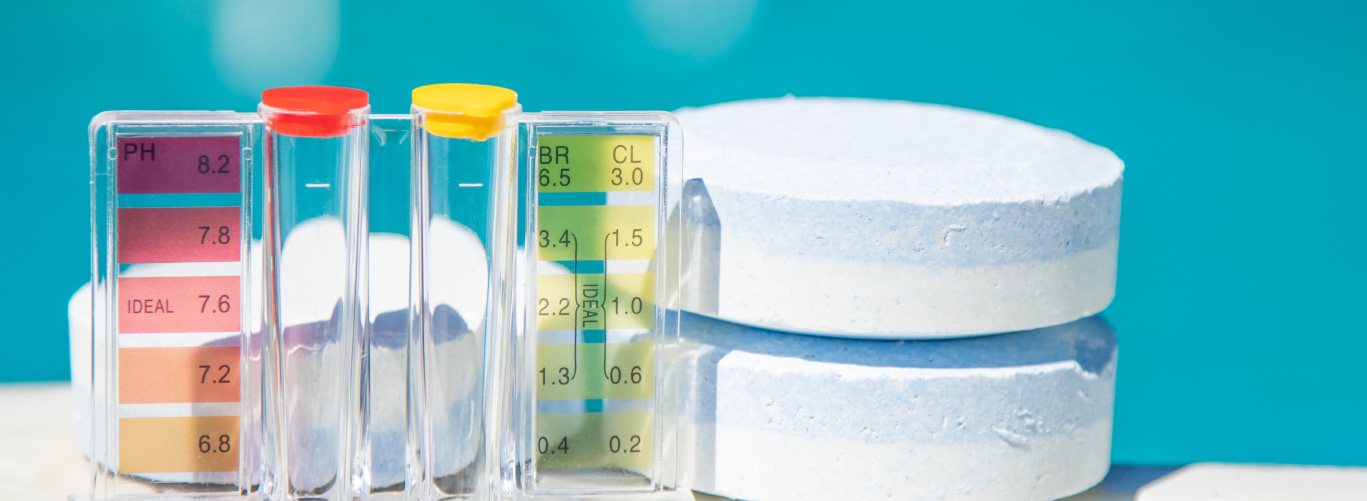
Best Practices for Pool Chemical Storage
Storing pool chemicals safely is not just about avoiding accidents; it’s also about preserving the efficacy of the chemicals and protecting your investment. Here are some best practices to follow:
Ventilation
Proper ventilation is crucial when storing pool chemicals. Ensure that your storage area is well-ventilated to prevent the build-up of fumes, which can be harmful when inhaled. A ventilated area also helps to maintain the stability of the chemicals, preventing them from degrading over time.
Temperature Control
Pool chemicals should be stored in a cool, dry place to maintain their effectiveness. Extreme temperatures can cause chemicals to break down or react dangerously. Avoid storing chemicals in areas that are exposed to direct sunlight or near heat sources.
Separation of Incompatible Chemicals
Certain pool chemicals can react dangerously when mixed. For instance, chlorine and acids should never be stored together as they can produce toxic gases. Always read the labels and follow the manufacturer’s guidelines for storing chemicals separately.
Safety Measures for Handling Pool Chemicals
Handling pool chemicals requires caution and care. Here are some tips to help you avoid accidents and injuries:
Read Labels and Instructions
Always read the labels and instructions on pool chemical containers before using or storing them. Follow the manufacturer’s guidelines for safe handling and storage.
Use Personal Protective Equipment (PPE)
When handling pool chemicals, wear appropriate PPE, such as gloves, goggles, and a mask. This will protect you from exposure to harmful substances and prevent accidents.
Keep Chemicals Away from Children and Pets
Store pool chemicals out of reach of children and pets. Consider using locked cabinets or storage areas to ensure that they cannot access the chemicals.
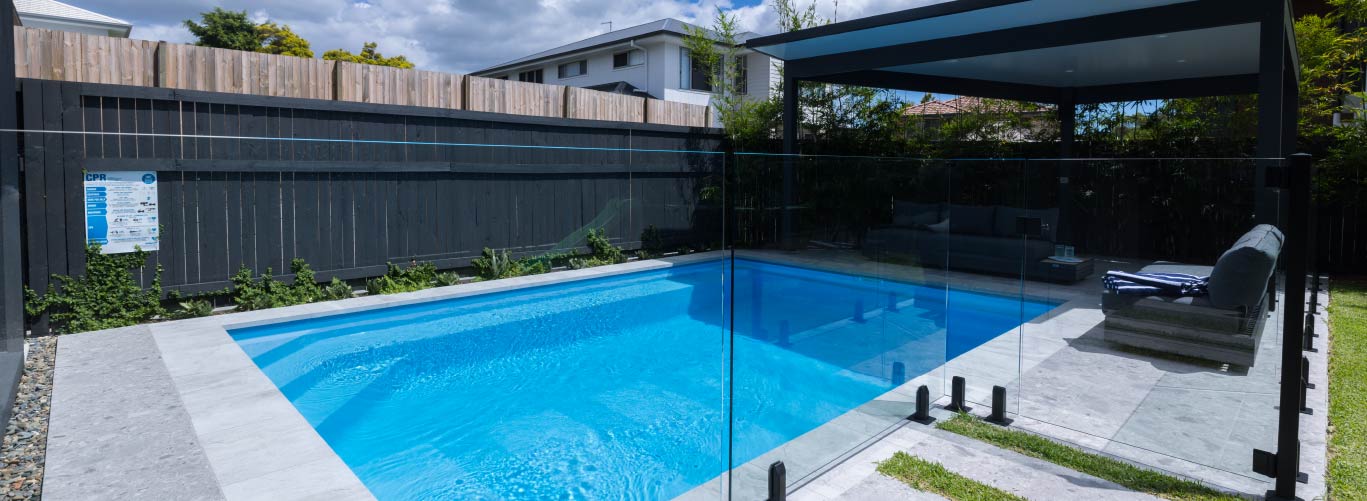
Maintenance and Checklists for Pool Chemical Storage
Maintaining your pool chemical storage area is essential for ongoing safety. Regular checks and updates will help you stay compliant and prevent accidents.
Regular Inspections
Conduct regular inspections of your storage area to ensure that all chemicals are stored correctly and that there are no signs of leaks or damage. Check for proper ventilation and temperature control.
Update Your Inventory
Keep an updated inventory of all pool chemicals in your storage area. This will help you keep track of expiration dates and ensure that you are not storing outdated or expired chemicals.
Safety Signage
Consider adding safety signage to your storage area to remind yourself and others of the proper handling and storage procedures. Signs can include warnings, emergency contact numbers, and instructions for dealing with spills.
Conclusion
Proper pool chemical storage is vital for the safety and longevity of your pool equipment, as well as the well-being of your family. By understanding the different types of pool chemicals and following best practices for storage and handling, you can create a safe environment for enjoying your pool. Remember to conduct regular maintenance checks and stay informed about the latest safety guidelines.
Looking to learn more about maintaining your pool? Check out our blog for a wealth of information on pool care and innovative pool ideas. From detailed maintenance guides to creative inspiration for enhancing your pool area, our articles are designed to help you get the most out of your pool. Visit our blog today and dive into expert tips and advice!
Tips And Tricks For Safe Pool Chemical Storage
Owning a pool is a luxury that comes with its own set of responsibilities. One of the most crucial tasks for any pool owner is ensuring that pool chemicals are stored safely. Proper storage not only ensures the longevity of your pool equipment but also protects your family from potential hazards. In this comprehensive guide, we will explore the importance of proper pool chemical storage, provide an overview of commonly used chemicals, and offer practical tips for keeping your pool area safe and secure.
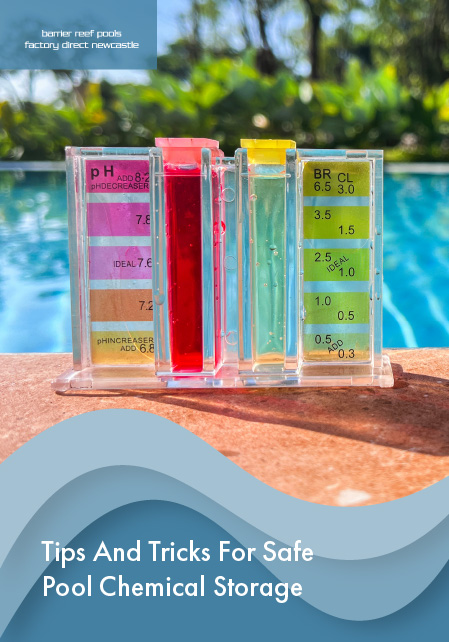
Introduction to Pool Chemical Storage
Swimming pools are a haven of relaxation and fun, especially during the hot summer months. However, maintaining a pool involves more than just skimming the surface and adjusting the pH levels. Responsible pool ownership includes the proper storage and handling of pool chemicals. Improper storage can lead to dangerous accidents, damage to your pool equipment, and even health risks for you and your family.
By following best practices for pool chemical storage, you can ensure that your pool remains a safe and enjoyable place for everyone. In this blog post, we will cover everything you need to know about storing pool chemicals safely, from understanding the different types of chemicals to creating a secure storage area.
Understanding Pool Chemicals
Before we dive into the nitty-gritty of pool chemical storage, it’s essential to understand the types of chemicals you’re dealing with. Commonly used pool chemicals include chlorine, bromine, algaecides, pH adjusters, and stabilisers. Each of these chemicals serves a unique purpose and has specific storage requirements.
Chlorine
Chlorine is the most widely used pool chemical for sanitising and disinfecting pool water. It comes in various forms, such as tablets, granules, and liquid. While effective, chlorine can be hazardous if not stored correctly. It should be kept in a cool, dry place, away from direct sunlight and other chemicals.
Bromine
Bromine is an alternative to chlorine and is often used in hot tubs and indoor pools. Like chlorine, it needs to be stored in a well-ventilated area, away from heat and moisture. Bromine tablets should be kept in their original containers with the lids tightly sealed.
Algaecides
Algaecides are used to prevent and control algae growth in pools. Although they are less hazardous than chlorine and bromine, they still require careful handling. Store algaecides in a cool, dry area and keep them away from children and pets.
pH Adjusters
pH adjusters, including pH increasers and decreasers, help maintain the proper pH balance in your pool water. These chemicals can be corrosive and should be stored in a cool, dry place, separated from other pool chemicals to prevent reactions.
Stabilisers
Stabilisers, also known as cyanuric acid, protect chlorine from being broken down by sunlight. They should be stored in airtight containers in a cool, dry location.
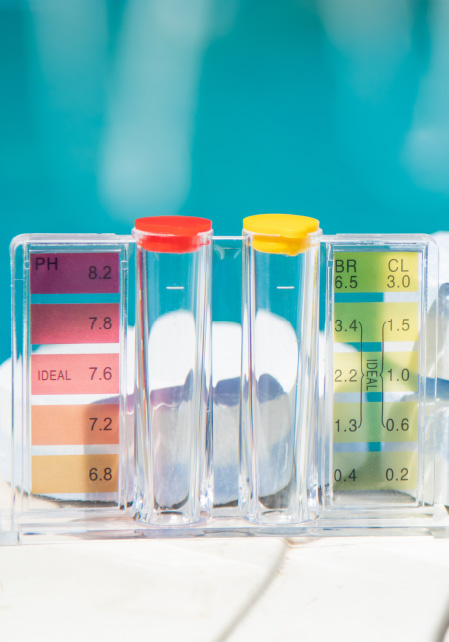
Best Practices for Pool Chemical Storage
Storing pool chemicals safely is not just about avoiding accidents; it’s also about preserving the efficacy of the chemicals and protecting your investment. Here are some best practices to follow:
Ventilation
Proper ventilation is crucial when storing pool chemicals. Ensure that your storage area is well-ventilated to prevent the build-up of fumes, which can be harmful when inhaled. A ventilated area also helps to maintain the stability of the chemicals, preventing them from degrading over time.
Temperature Control
Pool chemicals should be stored in a cool, dry place to maintain their effectiveness. Extreme temperatures can cause chemicals to break down or react dangerously. Avoid storing chemicals in areas that are exposed to direct sunlight or near heat sources.
Separation of Incompatible Chemicals
Certain pool chemicals can react dangerously when mixed. For instance, chlorine and acids should never be stored together as they can produce toxic gases. Always read the labels and follow the manufacturer’s guidelines for storing chemicals separately.
Safety Measures for Handling Pool Chemicals
Handling pool chemicals requires caution and care. Here are some tips to help you avoid accidents and injuries:
Read Labels and Instructions
Always read the labels and instructions on pool chemical containers before using or storing them. Follow the manufacturer’s guidelines for safe handling and storage.
Use Personal Protective Equipment (PPE)
When handling pool chemicals, wear appropriate PPE, such as gloves, goggles, and a mask. This will protect you from exposure to harmful substances and prevent accidents.
Keep Chemicals Away from Children and Pets
Store pool chemicals out of reach of children and pets. Consider using locked cabinets or storage areas to ensure that they cannot access the chemicals.
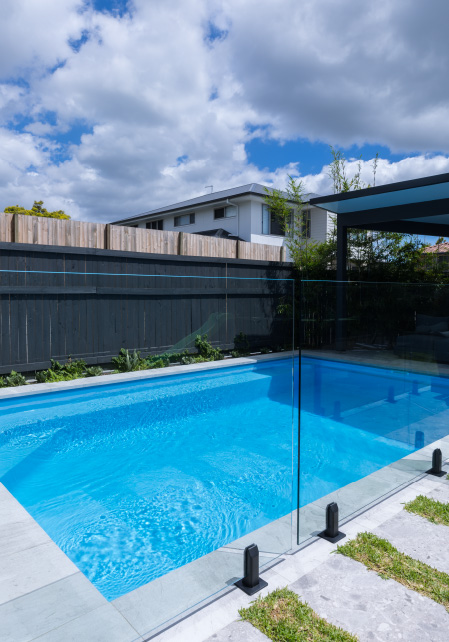
Maintenance and Checklists for Pool Chemical Storage
Maintaining your pool chemical storage area is essential for ongoing safety. Regular checks and updates will help you stay compliant and prevent accidents.
Regular Inspections
Conduct regular inspections of your storage area to ensure that all chemicals are stored correctly and that there are no signs of leaks or damage. Check for proper ventilation and temperature control.
Update Your Inventory
Keep an updated inventory of all pool chemicals in your storage area. This will help you keep track of expiration dates and ensure that you are not storing outdated or expired chemicals.
Safety Signage
Consider adding safety signage to your storage area to remind yourself and others of the proper handling and storage procedures. Signs can include warnings, emergency contact numbers, and instructions for dealing with spills.
Conclusion
Proper pool chemical storage is vital for the safety and longevity of your pool equipment, as well as the well-being of your family. By understanding the different types of pool chemicals and following best practices for storage and handling, you can create a safe environment for enjoying your pool. Remember to conduct regular maintenance checks and stay informed about the latest safety guidelines.
Looking to learn more about maintaining your pool? Check out our blog for a wealth of information on pool care and innovative pool ideas. From detailed maintenance guides to creative inspiration for enhancing your pool area, our articles are designed to help you get the most out of your pool. Visit our blog today and dive into expert tips and advice!


